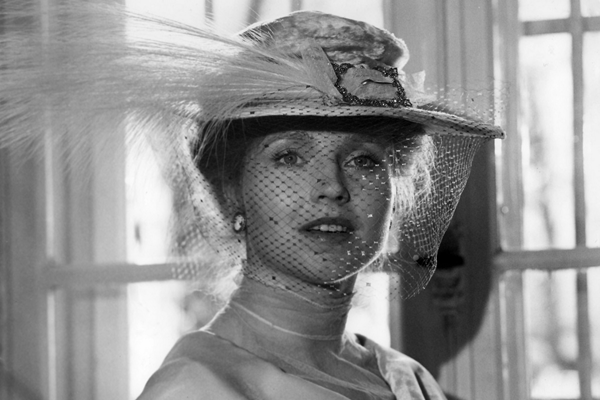
Director: Rainer Werner Fassbinder
Cast: Hanna Schygulla, Wolfgang Schenck, Ulli Lommel
West Germany 1972/3, 141 min.
When Rainer Werner Fassbinder embarked on his screen adaptation of Theodor Fontane’s novel Effi Briest (1884/5) in the autumn of 1972, he wanted the script to stay as close as possible to the original text, hence the title. Theodor Fontane (1819-1898) developed the style of German poetic realism during the 19th century. And whilst critical of certain aspects of society, he was anything but a Dickens: he represented the “Biedermeier” attitude of the cultured German middle class citizen of his time, which Fassbinder recreated lovingly in the sets of the film.
Fassbinder and his contemporary directors of the “New German Film” school had set out to make films with a programmatic approach, often explaining their intentions in longwinded title texts; in this case: Fontane Effie Briest or many like her, who are well aware of their potential but still accept the ideology of the ruling system in their heads, and therefore in their deeds, and so cement and affirm the ruling ideology.
Seventeen year old Effie (Schygulla) is living a very sheltered life with her parents in the small German town of Brandenburg. Her mother arranges a marriage to Baron Von Instetten (Schenck), a highly ranked civil servant who is twenty years older than his bride. The couple move to Kessin, a seaside resort at the Baltic Sea but Effie is bored, her husband often absent, making a career for himself. When Effie meets Major Crampas (Lommel), a superficial seducer, their relationship is not so much passionate, but rather indolent. Six years later, Effi and von Instetten now live in Berlin, and he discovers some old letters which disclose his wife’s affair. He challenges Crampas to a duel and kills him. Then he divorces Effi, keeping their daughter with him. Effi ‘retires’ to her parent’s home and dies soonafter – not so much of a physical ailment, but a broken heart.
Aesthetically Effi is the exception in Fassbinder’s work. His cinematic style usually veers towards highly emotional settings with the cinematography reflecting the passion and action with abandon. But Effie is austere, clinging closely to the tone of the book and the performances echo this stiff quality. Shooting in black and white and using inserts (black on white background) and circular fade-outs, Jurgen Jurgers (Christiane F) evokes an 19th century atmosphere of elegant discretion that only comes to life during the outside carriage scenes, making the drama feel like a silent movie with dialogue. Mirrors in the rooms reduce the usual shot-counter shots and cuts, this way, the close-ups are very intense. The performances are buttoned down emotionally frustrated by the claustrophobic, soulless atmosphere.
Fassbinder (who narrates the voice-over) explains his concept of a ‘film to be read’: “I wanted to make sure that the audience does not experiences this film like others, which reach heart and soul, but this is only a film for the head; a film, where the audience does not stop reflecting, and like reading a book, where the letters and sentences become the narrative, the images here would tell the story.”AS
SCREENING AS PART OF A MAJOR BFI RETROSPECTIVE | MAY 2017 | NOW AVAILABLE ON DVD
https://youtu.be/fJp4hMpl5DY